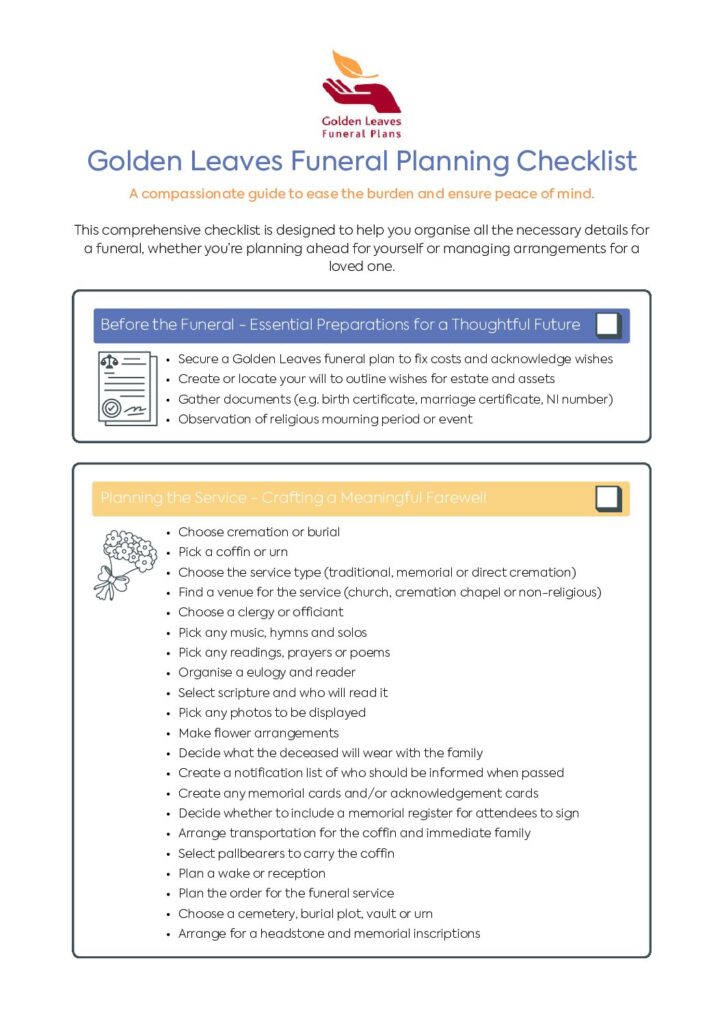Golden Leaves took care of all the arrangements, while we could reflect on happy memories.

Funeral Planning Checklist
When someone dear to you, like a friend or a loved one, passes away, it’s completely normal to feel a sense of being adrift and emotionally drained. Arranging a funeral can be a difficult process due to the variety of decisions to be made.
During times when you’re faced with making decisions about everything from the burial plan to the finer details, like music choices, invitations and floral arrangements, it’s understandably overwhelming. But don’t worry, we’re here to assist you.
At Golden Leaves, we understand that this period can be incredibly challenging. That’s why we’ve designed a comprehensive funeral planning checklist to help you manage all the details of arranging a funeral and alleviate some of the stress at this tough time.
Planning a Funeral Checklist
Preplanning a funeral offers several valuable benefits. By taking the time to outline your preferences and decisions in advance, you ensure that your wishes are respected and carried out with precision. This relieves your loved ones from the burden of making difficult choices during a period of emotional distress.
Choosing a funeral plan will help you plan the funeral you want. Moreover, preplanning allows you to lock in current prices, potentially saving your family from financial strain in the future. It’s a thoughtful way to provide a clear roadmap for your farewell, offering solace to both you and your family, and ensuring that your legacy is celebrated just as you envision.
The funeral arrangements checklist below can help you start a conversation with your loved ones and ensure you have considered everything to plan your funeral.
Download a printable funeral checklist
Before the Funeral
- Choose a Golden Leaves Funeral Plan: a prepaid funeral plan fixes the cost of your chosen funeral director’s services at today’s prices, protecting your family from future inflation. It ensures your wishes are known and alleviates financial worry for those left behind.
- Create your will: a clear, up-to-date will outlines your final wishes regarding your estate and assets, preventing potential complications and disagreements for your family.
- Gather important documents: knowing where essential documents are kept (birth certificate, marriage certificate, National Insurance number, bank details, pension information, insurance policies) can streamline administrative tasks.
- Observation of religious mourning period or event: if there are specific religious or cultural practices around mourning, rituals or events following a death, identifying these in advance ensures they can be respectfully observed. This can significantly influence timings and family gatherings.
Planning the Service
- Cremation or burial decision: this choice dictates many subsequent arrangements, including the type of committal.
- Choice of coffin or urn: this is based on personal preference and practical considerations for burial or cremation.
- Service type (traditional, memorial or direct cremation: this determines the formality and structure of your farewell. A direct cremation removes the immediate service, allowing for a separate memorial.
- Venue for the service: where the service will take place (e.g. church, cremation chapel, non-religious venue, or no service if direct cremation).
- Clergy or officiant: the person who will lead the service, aligning with religious or non-religious preferences.
- Music, hymns and solos: personalises the service and evokes memories.
- Readings, prayers or poems: allows for words of comfort, reflection or significance to the deceased.
- Eulogy and reader: a heartfelt tribute to the life lived, delivered by a chosen speaker.
- Scripture and who will read it: for religious services, selecting specific passages and identifying who will read them adds profound meaning and personal significance to the ceremony.
- Photo to be displayed: a visual celebration of life and memories.
- Flower arrangements: a traditional way to express sympathy and decorate the service.
- What the deceased will wear: a personal decision often made with the family.
- Notification list: ensures family and friends who should be informed are contacted promptly.
- Memorial cards and/or acknowledgement cards: provides a keepsake for attendees and a means to thank those who offered support.
- Memorial register: a guest book for attendees to sign, creating a lasting record of those who came to pay respects.
- Hearse and funeral cars: arrange transportation for the coffin and immediate family.
- Pallbearers: these are the individuals chosen to carry the coffin. Selecting them in advance ensures this important role is filled with those you trust and wish to honour.
- Wake or reception: an opportunity for family and friends to gather, share memories and offer support after the service.
- The order for the funeral service: creating a detailed order of service provides a clear structure for the ceremony, ensuring all chosen elements flow smoothly and respectfully. It also acts as a guide for attendees.
- Choosing a cemetery, burial plot, vault or urn: the resting place for a burial or cremation.
- Headstone and memorial inscriptions: a lasting monument and tribute at the gravesite.
Immediately After Death
- Notify Golden Leaves: our team will guide your family through the immediate process, including the dignified transfer of the deceased into the funeral director’s care.
- Obtain a medical certificate of cause of death: this certificate is issued by a doctor and is legally required for registering the death.
- Register the death: this is also a legal requirement, usually done at the local Register Office. Your family will receive the death certificate, which is needed for many administrative tasks.
- Collect all necessary documents: your family will require the death certificate, any existing funeral plan documents and your identification.
After the Funeral
- Thank you notes: a gesture of appreciation to those who sent condolences, flowers or offered support.
- Managing memorial donations: if donations were requested in lieu of flowers, ensure these are collected and passed to the chosen charity.
- Scattering or internment of ashes: for direct cremation, this is where the memorialisation often takes place, at a chosen meaningful location.
None of us likes to think about our funeral. But funeral preparation can genuinely provide comfort for your loved ones when they need it most. A Golden Leaves funeral plan means we’re here to assist you with the preplanning and arrangements, ensuring your envisioned farewell comes true.
In the unfortunate event of your passing, Golden Leaves is responsible for organising everything, lessening the load on your family, and easing some of the financial concerns during their challenging moments.
Frequently Asked Questions About Funeral Planning
What is included in a funeral planning checklist?
A funeral planning checklist typically includes sections for preplanning decisions, immediate actions after a death, details for the service itself, and post-funeral considerations. It covers legal, financial and ceremonial aspects to ensure a complete guide.
How do I plan a funeral step-by-step?
Understanding the process of arranging a funeral can bring considerable peace of mind. While the exact steps can vary slightly depending on individual circumstances and whether you choose a traditional service or direct cremation, a clear path can be followed.
For a more detailed, step-by-step guide to funeral planning, please visit our dedicated How to Plan a Funeral page.
Can I download a funeral checklist?
Many reputable funeral planning services, including Golden Leaves, offer downloadable funeral planning checklists to help you organise these important details. These printable resources provide a guide you can keep and refer to as needed.












